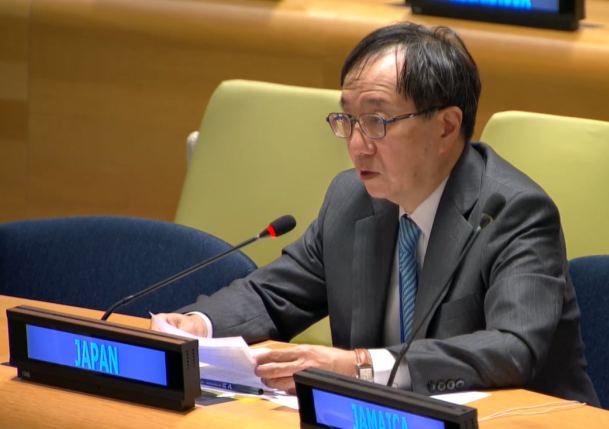Statement by H.E. Ambassador YAMAZAKI Kazuyuki, Permanent Representative of Japan to the United Nations, at the High-level Thematic Debate : Multifaceted Aspects of Peace and Security in Africa and the Future of Peacekeeping Operations
2025/6/25

(As delivered)
Thank you, Mr. President.
Japan applauds your initiative to convene today’s debate. It is timely for this august assembly to discuss the UN’s cooperation with Africa as the continent continues to face formidable security and development challenges and UN peacekeeping operations in Africa are confronted with increasingly complex operational environments.
The UN-AU partnership has steadily strengthened and deepened over the years, including through annual meetings between the AUPSC and the UN Security Council, as well as between the UN Secretary-General and the AU Commission Chairperson. The PBC Chair’s participation today also demonstrates the commitment by all UN bodies to UN-AU cooperation, which Japan welcomes as the informal coordinator between PBC and the General Assembly.
The adoption of Security Council resolution 2719 (2023) is a culmination of such efforts. Japan, as a Council member at the time, voted in favour. It is a landmark resolution that encourages African ownership and contributes to further enhancing UN-AU cooperation and coordination.
Mr. President,
Now, we need to strengthen what we have built.
In this regard, I want to highlight two points.
First, achieving sustaining peace requires adopting a comprehensive approach based on the concept of human security through the HDP Nexus. We need a long-term perspective of peacebuilding and conflict prevention that addresses the root causes of conflict when discussing peacekeeping operations, be they UN missions or AUPSOs. This perspective should also be incorporated in relation to resolution 2719 when the UN and AU work to formulate possible AUPSOs, such as in its strategic assessment.
Second, the PBC should be more actively utilized. The AU has a standing invitation to all PBC meetings and the AUPSC and PBC hold annual consultative meetings. We should continue to discuss concrete ways to proactively leverage the PBC’s convening power and its platform for the AU and its ventures, including present and future AUPSOs, to advise and garner political and financial support from actors within and beyond the UN system, such as the IFIs. The ongoing Peacebuilding Architecture Review is one such occasion to this end.
Mr. President,
Recognizing the importance of AUPSOs, Japan provides capacity building to their personnel through the UN Triangular Partnership Programme and, this year, we contributed 3 million USD to AUSSOM. We also continue to support UN peacekeeping operations, such as sending uniformed personnel to UNMISS.
To conclude, Japan remains a committed partner of Africa in its efforts to achieve long-term peace, stability, and development, including through the TICAD process.
I thank you.
Japan applauds your initiative to convene today’s debate. It is timely for this august assembly to discuss the UN’s cooperation with Africa as the continent continues to face formidable security and development challenges and UN peacekeeping operations in Africa are confronted with increasingly complex operational environments.
The UN-AU partnership has steadily strengthened and deepened over the years, including through annual meetings between the AUPSC and the UN Security Council, as well as between the UN Secretary-General and the AU Commission Chairperson. The PBC Chair’s participation today also demonstrates the commitment by all UN bodies to UN-AU cooperation, which Japan welcomes as the informal coordinator between PBC and the General Assembly.
The adoption of Security Council resolution 2719 (2023) is a culmination of such efforts. Japan, as a Council member at the time, voted in favour. It is a landmark resolution that encourages African ownership and contributes to further enhancing UN-AU cooperation and coordination.
Mr. President,
Now, we need to strengthen what we have built.
In this regard, I want to highlight two points.
First, achieving sustaining peace requires adopting a comprehensive approach based on the concept of human security through the HDP Nexus. We need a long-term perspective of peacebuilding and conflict prevention that addresses the root causes of conflict when discussing peacekeeping operations, be they UN missions or AUPSOs. This perspective should also be incorporated in relation to resolution 2719 when the UN and AU work to formulate possible AUPSOs, such as in its strategic assessment.
Second, the PBC should be more actively utilized. The AU has a standing invitation to all PBC meetings and the AUPSC and PBC hold annual consultative meetings. We should continue to discuss concrete ways to proactively leverage the PBC’s convening power and its platform for the AU and its ventures, including present and future AUPSOs, to advise and garner political and financial support from actors within and beyond the UN system, such as the IFIs. The ongoing Peacebuilding Architecture Review is one such occasion to this end.
Mr. President,
Recognizing the importance of AUPSOs, Japan provides capacity building to their personnel through the UN Triangular Partnership Programme and, this year, we contributed 3 million USD to AUSSOM. We also continue to support UN peacekeeping operations, such as sending uniformed personnel to UNMISS.
To conclude, Japan remains a committed partner of Africa in its efforts to achieve long-term peace, stability, and development, including through the TICAD process.
I thank you.
